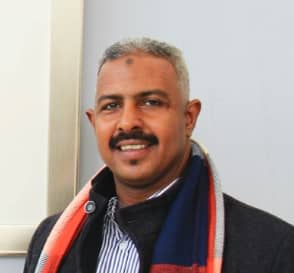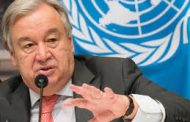By : Dr. Mohamed Hassan Mohamed
The African continent is on the verge of making a tough decision in the period ahead. With leaning towards one of the two parties, and perhaps at the end of the cold war between America and what was known as the former Soviet Union, history will repeat itself, most of the continent’s countries sided with the winning party. Africa, however, was the loser and remained what it is suffering from the lack of development and the poor infrastructure and economy Afflicted by many conflicts and challenges, afflicted by epidemics and diseases without having a companion next to her. However, now the US-Chinese dispute is revived, and “This trade war may be a diplomatic possibility for African countries, and it will be very difficult for Africa to avoid it.” Following China-America trade cooperation, the U.S. president openly announces an economic war, this time involving businesses. Technology and connectivity. America is also building a registry of individuals and groups. There is a list of countries that sponsor terrorism, and there is a list of countries that are politically forbidden, and Huawei is on the list of organizations.
Ten countries, led by the United Kingdom, follow the aggressive American approach against China, identified by the British Newspaper the Times as “democratic countries,” to minimize dependence on the infrastructure of the fifth generation of mobile communications networks offered by the Chinese firm “Huawei.” Surprisingly, the United Kingdom declared the situation. Last May, the United States imposed sanctions that prohibited the firm from obtaining the semiconductor designs produced using American programs and technology; this is because of concern that China would gain global technological dominance.
According to a statement issued by the White House, President Trump’s decision stipulates “protecting America from foreign competitors who are actively creating and exploiting information and technology communications infrastructure and services gaps.” This reflects American fear, as Huawei is the world’s largest provider of telecommunications network equipment and telecommunication services. Unlike most other Chinese companies in the same sector, most of Huawei’s operations and projects are focused outside of China, and in many countries, it is the leading firm. Throughout Africa, Asia, and Europe.
Concerning the fifth-generation technology, which reflects a transformation and major shift in this region that entails hundreds of billions of dollars, and this progress requires new compliant devices, appliances, and phones. Huawei is the world’s first company in this field today, and for many telecom companies, it is almost impossible to replace it. For course, these components represent a major challenge for the USA and many of its allies.
The American position:
It represents the hegemony of the United States of America and its false claims to defend rights and global trade, and its resolve to be the guardian of charters and treaties that allow us to comply with innovations and maintain freedoms. It represents its apprehension of Chinese development in terms of international trade, economic growth, technology-possessing, and building a solid base for the global digital economy without obstacles and complexities that grant one continent rights, turn another continent, help countries and deprive others.
Some say Washington has taken the lead in the global battle against “Huawei Technologies,” a technology giant that has become one of the main pillars of China’s effort to expand its global influence over the three decades since its inception. It intensified the battle against Huawei. ‘ If U.S. President Donald Trump signed an executive order essentially banning the use of Huawei equipment in U.S. telecommunications networks for reasons of national security, the Ministry of Commerce imposed restrictions on the procurement of U.S. technology by the company, and action against China began to take a more coordinated shape between the countries of the ‘ Western Alliance ‘ When discussions began between the British and American parties on the formation of a kind of ‘ Fifth Generation Party, ‘ or as some British newspapers called it ‘ D10 Club, ‘ the letter D symbolizes Democracies Include seven major countries: Canada, Japan, France, Germany, Italy, the United States and the United Kingdom, as well as three countries: Australia, South Korea and India and the United Kingdom.
Russia and China position:
Russian President Vladimir Putin has announced that intimidating, and perhaps real, U.S. actions such as imposing a ban on the Chinese telecommunications company Huawei will lead to trade wars. Putin accused Washington of what he said was “selfish and unbridled economics.” In a speech given by Chinese President Xi Jinping, who was next to him, at an economic forum held in St. Petersburg, Putin said that “countries that had traditionally advocated free trade and honest and open competitiveness started to speak the language of trade wars and tariffs, the language of open economies. Many circles have already begun to call it the global digital era’s first technological battle.” The Chinese president, for his part, proclaimed that his nation is “ready to share technological inventions with all partners, especially fifth-generation technologies.
The African position:
Competition between China and America on the continent’s technological level would, of course, be in favor of the Chinese dragon, who has succeeded in projecting its dominance in recent years, not only on the technological level, but on the economy as a whole, since the Chinese policy relies primarily on two main axes, the first: low price, the second: opening new markets, and then Africa was one On his part, Ghanaian Defense Minister “Albert” stated that Huawei’s surveillance technology assists in the apprehension of the criminals. “When a crime is committed, thanks to the cameras, we perform miracles,” he said on a video. In April, the Kenyan Government signed an agreement worth 17.5 billion shillings, or $172 million, with Huawei to set up a data center and smart city services. Huawei offers a security monitoring program called “Secure City.” This move will help prevent crimes against ordinary citizens, passengers, students, older people, etc.
According to the company website, before they happen. Such systems were launched with 4000 “smart” security video cameras in the Kenyan capital, Nairobi, as well as in Mauritius. They are set up in the Indian Ocean, at 2,000 locations across the world. Huawei is now seeking to improve its relationships and its position in Africa. The company also extended its alliance with the African Union. EOLBREAK-Robin Niser, an economist at the French financial services company, which specializes in sub – Saharan Africa, said, “Huawei remains a major and essential player by placing itself in this very important sector.”-It is understood that Huawei started its research in Africa in 1998 and now operates in 40 countries, providing G4 networks to more than half of the continent. The company is to be marketing the 5 G network. Huawei has many activities in Africa, beyond just selling smartphones and developing mobile networks. In South Africa, for example, Huawei provides training courses at the country’s best universities. A qualified fifth-generation training course was unveiled this year.
North African countries focused on the ability of communications and information technology to penetrate barriers of distance, terrain and time while introducing mobile communications technologies in previously inaccessible areas, where this technology will provide governments with a platform for providing electronic services to all parts of the nation. Electronic services are not limited to, electronic payment and cash transfer applications. However, they extend to health and electronic education services, government services, agriculture, smart cities, and other services that will allow a better connection between people, industry and society. -Bob Collymore, CEO of the Kenyan telecom giant Safaricom, said Huawei was “a great partner for many years.” According to IDC, Huawei is the fourth largest smartphone sales company. In Africa, for example.
Any modification or suspension of this company in Africa shall return the content to the first square and place it in isolation. The United States or its allies will be unable to provide any technical aid. It has no desire and ability to set up giant infrastructures that can accomplish a part of what this company has accomplished and that the continent’s simple citizens can benefit from high – end services through their capabilities and limited resources. Countries can develop their capabilities and benefit from the technology provided by this company and help countries to develop and grow, regardless of the war against China, the African continent will not be able to dispense with this company’s services, since the simple citizen is not concerned with a cold war as much as he needs a service at the lowest cost.
https://khartoum-today.net/
 Sudan army chief Al Burhan freezes bank accounts of paramilitary RSF
Sudan army chief Al Burhan freezes bank accounts of paramilitary RSF Sudan’s SAF & RSF sign agreement intended to lay groundwork for humanitarian assistance
Sudan’s SAF & RSF sign agreement intended to lay groundwork for humanitarian assistance SAF, RSF agree on extension truce for the sixth time
SAF, RSF agree on extension truce for the sixth time Army, RSF agree to extend truce for 72 hours
Army, RSF agree to extend truce for 72 hours Sudanese people fled to Egypt amid acut humanitarian crisis
Sudanese people fled to Egypt amid acut humanitarian crisis THE ELEPHANT IN THE ROOM
THE ELEPHANT IN THE ROOM Death toll from Sudan fighting tops 180 as clashes in Khartoum enter fourth day
Death toll from Sudan fighting tops 180 as clashes in Khartoum enter fourth day By the UN Secretary-General Op-ed on G20 – 8 billion
By the UN Secretary-General Op-ed on G20 – 8 billion A strong military key to maintaining world peace
A strong military key to maintaining world peace Beautiful China shows new chapter of ecological conservation
Beautiful China shows new chapter of ecological conservation

THE US-CHINESE CONFLICT AND IT’S IMPCAT ON AFRICA
About the author
Related Articles
2020 All rights reserved khartoum-today.net 0124293222






